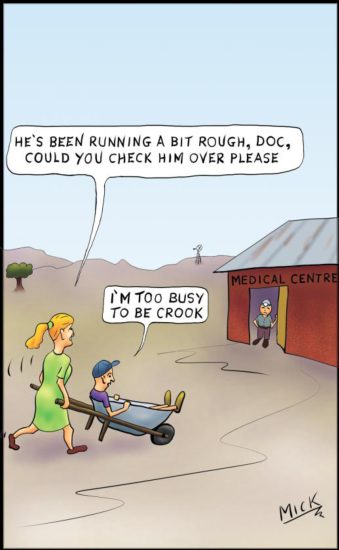A statement I often find myself saying to family members, friends, and individuals I interact with through the work we do at Regional Men’s Health is look after yourself mate! This message does come from a genuine place of concern for these people and encompasses a key component of our vision statement which is to empower men and communities to take responsibility for their wellbeing and health. However, what does it really mean and look like for blokes living and working in regional, rural and remote WA?
Looking after oneself is best described as self-care. This involves a deliberate and self-initiated act to help maintain our physical, mental, or social/spiritual wellbeing. As humans, we all live different lives and the circumstances around our work, family commitments, individual capacity and environmental factors can change, so self-care will vary from person to person. However, for most of us we should endeavor for it to be:
- Regular & ongoing (it’s not just a one-off thing we do and forget about for the rest of the year).
- More than just the time left over. Don’t leave yourself the dregs, time for self-care must be a necessity not a luxury! Factor it into our daily, weekly, or monthly routine/planning.
- An important part of our work-life balance. It can help us cope with challenging times and makes us more effective managing the demands of daily life.
For a lot of men, the pursuit of business goals and success (warrior attitude – winning) often pushes personal wellbeing and health issues down our list of priorities. When we think about it, acts of self-care give us the opportunity to reset and gives a circuit breaker effect on the daily grind and rat race that life can often feel like. Especially in these times of fast-moving technological advances, bombardment of social media influences, information accessibility and blurring of work-life balance (i.e. working from home, 24/7 access through smart phones). Self-care makes us more effective and offers us a buffer from the bumps in the road of life and ignoring this fact can result in us not being up to par in any aspect of our lives. Relationships can become strained, we can suffer burn out, harbor resentment, and miss out on the things that we don’t realise are important until they’re gone.
There is a varying range of definitions for self-care, but they all point towards us as individuals making the time to do things on a regular basis to help us live well and supports good physical, mental and social/spiritual wellbeing, including but not limited to:
- Starting with small changes that we can manage. Ask yourself ‘what’s in my control, do I need to learn to say no to unhelpful habits, behaviors, or extra commitments?’.
- Changing our mindset and putting ourselves first. We shouldn’t see this as selfish but a form of good self-management. We must actively plan and commit for self-care to happen.
- Being connected to our passions, interests and a sense of belonging (family/community).
- Eating well, regular exercise and a good sleep routine.
- Getting a checkup with our GP and other health care professionals.
Remember, self-care starts with you so try doing something that makes you feel good, gets you excited and puts a smile on your face. If you’re finding it hard to do this don’t forget …before it all gets too much… Talk to a Mate®!!
By The Regional Men’s Health Initiative




Comments are closed.